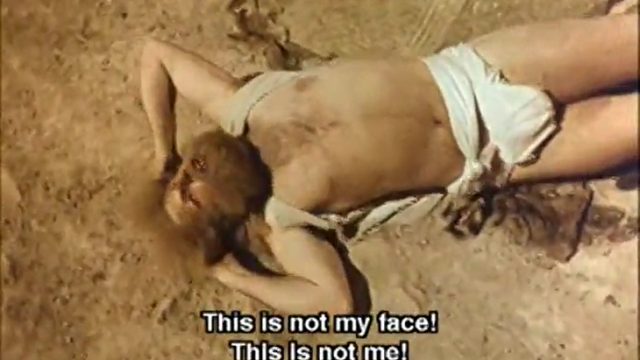I am conceding defeat here. I have no idea what the fuck this movie is about. All movies – no, all art is inevitably looking at clouds and seeing faces; people are remarkable (and often gleeful) at seeing what they want to see. It’s a very specific kind of funny to me when someone who normally professes world-weariness will admit to not knowing what they’re looking at, because it’s usually expressed as moral outrage that someone would do something they don’t understand (“That which exists without my knowledge exists without my consent.”). While this didn’t move me at the level of many of my favourite works – probably because I do understand movies a little better than when I watched Cowboy Bebop and a little because much of this is outside my value system – El Topo kept catching me off-guard, shifting in meaning every time I thought I grasped it, until the only level I feel fully confident articulating a full position on is its aesthetic.
El Topo is a silent film that happens to have music and dialogue dubbed over it. The camera moves, depending on the scene, with the logic of Buster Keaton and Sergei Eisenstein; often the editing slips into dream-like montage that slides past establishing how people move through the space and into entirely subjective memory and imagination, and occasionally it slips into slapstick comedy. There’s a staginess to the blocking indicating that this is larger-than-life; we are to be delighted by what’s put in the frame – costumes, sets, props – as we are by how it’s framed. This is not to say that sound or dialogue is irrelevant; we are bombarded with sounds, often repetitive and abrasive sound (like the weird screeching when El Topo passes through a town of dead people).
But what of the story? My initial reaction was that this was the self-important blathering of a guy who wanted to lecture the world. The clearest thing about this movie is the sense of constant violence in which everyone is as cruel to each other as they can get away with, and the fact that El Topo is a cool guy in a cool outfit who outfights everyone around him in the first five or ten minutes led me to assume this whole movie would be about that – about a guy smarter and more powerful than everyone telling us how to also be powerful. But then he starts seeking out gurus, sitting and listening carefully to them, getting tricked and beaten by them and often winning only because they (or some spiritual force) allowed him to. And then he starts getting really degraded!
Which crosses over so far into degradation that it starts to feel like some kind of pathetic Messiah complex, as if the movie is begging us to pity El Topo because he was put here to suffer for us. It’s always hard for me to draw the line with this kind of thing; two of my favourite characters ever are Raiden and Zoidberg, both designed to suffer as much as possible for my education and amusement respectively, but so often a long-suffering character feels like someone rationalising the suffering they give by the suffering they’ve gotten. El Topo won me back over by warping its title character almost literally beyond recognition.
El Topo is a Western. The title character is a gunslinger in what appears to be 1800’s Mexico, and he initially spends his time fighting bandits and saving the innocent. But Biblical and mystical elements keep intruding upon the cliches, until he is trapped in a cave for years and his identity is rewritten; he becomes a travelling clown aiming to raise money to free a bunch of people trapped in a cave. The film appears to have dropped its genre elements as plot in favour of using them for aesthetic and setting. It’s only upon finding his son – now a grown man – that the Western elements come back, with the son becoming the gunslinger with righteous fury towards his father. There’s not much more cinematically sympathetic than a parent who realises they have failed their child; it’s a loss and failure that strikes much more strongly than the mere threat of death.
And yet I still don’t feel confident I know what this film is about! There are large chunks I’m missing; the infamous rape scene, the disabled people – used for surrealist effect and yet still people who live in the world – the fact that, even through all of this, it feels like a Messiah fantasy and even through that like it means something. A lot of the things I’ve written about are things I’ve watched or played a million times and formed a complete understanding of; do I do this movie injustice by writing about it like a week after watching it once? Or is sharing my half-formed impression a necessary part of both my relationship to it and its place in the world?


